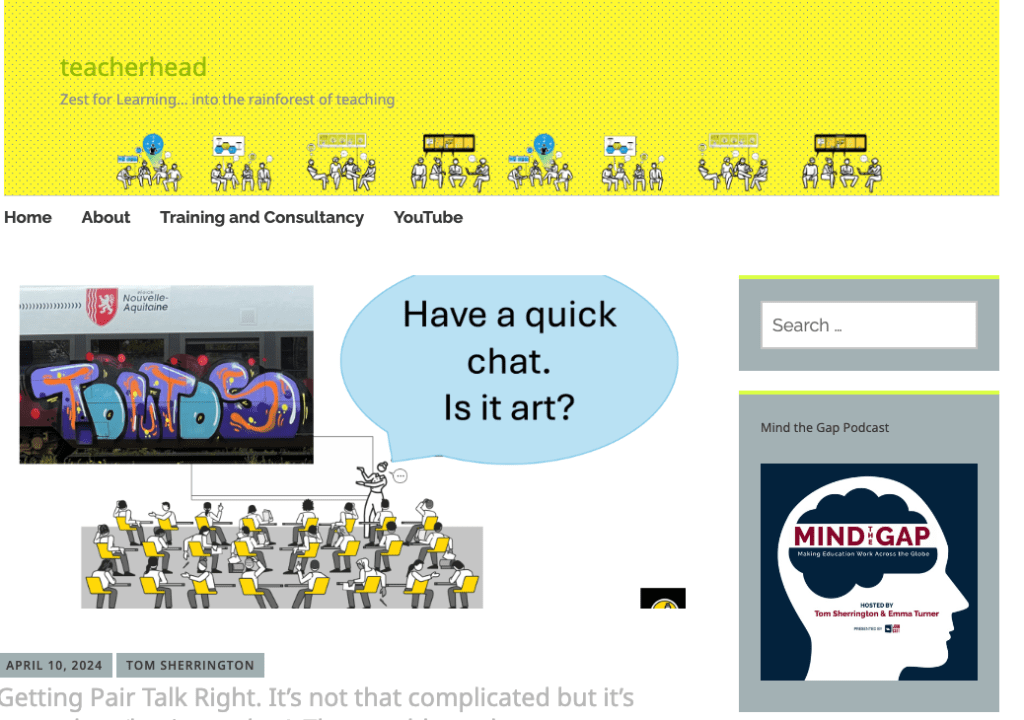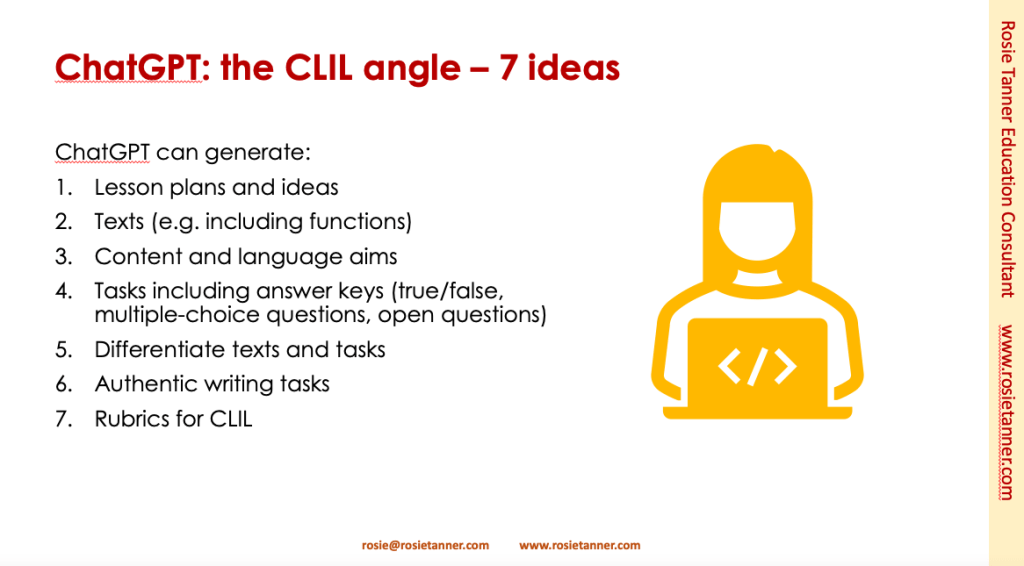Welcome to Talking CLIL #12, looking at questions we ask in the lesson. In this edition:

- new email address
- CLIL consultancies
- CLIL coach course in autumn 2024
- Questions and CLIL
- CLIL and AI
- random tips
- CLIL Skills book
CLIL consultancies
As the demand for bilingual education expands, more and more institutions are inviting me for consultancy and advice work, as well as CLIL courses and observations. For instance,
- advice on setting up bilingual education
- conducting a Quick Scan to evaluate the implementation of CLIL (Content and Language Integrated Learning) in their institution before an inspection.
- curriculum development in higher education, e.g. bringing more English content into higher education curricula
- guidance on building bilingual teams.
Contact me at rosie@rosietanner.com for more information.

CLIL coach course September-November 2024

Are you a more experienced or senior CLIL teacher who would like to support your colleagues in developing CLIL? This is the course for you! Learn practical CLIL coaching skills in a safe environment.
After two successful CLIL coach courses this year, one in Apeldoorn and one in Amersfoort, I am already planning the next one. Here are the new dates for 2024:
Dates: Wednesday 11 September, Tuesday 24 September, Monday 4 November (personal online coaching with Rosie) & Monday 21 November 2024
Time: 10-16:00 (coffee from 09:30)
Location: to be decided.
More information and an online application form on my news page.
Questions and CLIL
I was observing a teacher last week who asked a lot of questions, as we all do. She asked the same question about twenty times, viz. “What do you think about that?” The result? Blank faces, stares, students looking down at their desks and not much interaction. Why was this? I asked myself, and came up with some reasons:
- The question was asked to the whole class, not to individuals.
- The teacher gave no thinking time before moving on quickly to the next part of her lesson.
- The question was a “higher order question”. A higher-order question stimulates thinking and requires strong understanding of material. In the lesson I observed, there wasn’t really time to think.
- The question was not a genuine one; it seemed to be a favourite one but the teacher did not really appear very interested in her students’ answers.


Thinking more deeply about Think, Pair, Share
And, quite coincidentally, I hve recently read Tom Sherrington’s superb blog post about questioning.
If you don’t read anything else this week, read this post!
Sherrington goes into some detail about how to use the simple interactive activity, Think, Pair, Share effectively. Of course, as a CLIL teacher, you often use this activity. But does it really work for you? Here are some of its problems, according to Sherrington, loosely summarized by me:

- Students call out one-word answers to each other as they pair up.
- Only one student does the work in a group or pair.
- Students don’t know how to organize their answers or what the expected output is.
- Students just don’t listen to each other.
- Knowledge of an unknown keyword prevents students from answering correctly or even from understanding the question.
- Students don’t argue or justify, they just assert their own opinion.
- Students misunderstand the question asked and say nothing to each other.
Image by Gerd Altmann from Pixabay
Think, pair, share (TPS): do it right!

Here is a downloadable handout for you. Page one describes TPS if you aren’t familiar with it already and shows my simplified version of Sherrington’s Three Golden Rules for Think, Pair, Share. On page two, there are some suggestions for effective questions and tasks to use for TPS.
If you follow these ideas, TPS might just work better in your classroom. In this way, you can encourage all students to participate, thus supporting robust, profound understanding and effective communication. You’ll also save some time.

CLIL and AI (ChatGPT): pdf of slides
I gave a workshop on CLIL and AI – basically about ChatGPT – at the World Teachers Festival in Rotterdam in March 2024. Mail me (rosie@rosietanner.com) if you would like a PDF of my slides.

CLIL links

Between newsletters, I gather what I consider useful sites and links for CLIL teachers. Here are my suggestions for this issue:
More on asking questions from the Teaching English site: a thorough examination.
From Edutopia, some 60-second strategies for primary and secondary.
Also from Edutopia, 10 creative ways to end your lessons.
Crash course: clear videos on many different topics.
Did you know that EAP Foundation also has quizzes on academic language? Check it out!
Image credit: Pete Linforth at Pixabay
Please amend my email address in your address books!
rosie@rosietanner.com


LinkedIn presents me with great professional content to read or watch and a friendly group of professional colleagues. So do link up with me there for more CLIL ideas.
Free CLIL Skills book
Download my book CLIL Skills (co-authors Liz Dale and Wibo van der Es) here or by clicking on the image. It’s free to use under a generous Creative Commons license.


